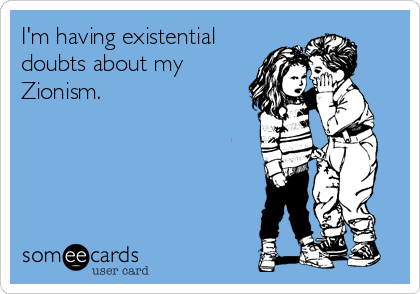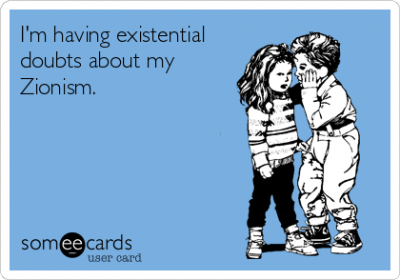I don’t remember much about my brief stint on the high school crew team, probably because it only lasted one spring season when I was fourteen. Most of what I do remember is meaningless—and not exceedingly positive—like not being able to carry my share of the boat and thereby forcing a coach to take over for me, or whacking myself with oars. But there is one conversation during a practice that I recall every time I think about that spring, one that had little to do with rowing but still had a profound effect on me. I found a few teammates engaged in a critical conversation, whose specific content I can no longer remember, about Israel. One of them turned to me, asking what I thought about Israel.
“Well, I’m Jewish” I said, thinking at the time that it obviously encapsulated my feelings toward the nation, that it undoubtedly expressed my support, that Zionism was, of course, a fact that flowed through the blood my mother gave me, the same way that my Jewishness did.
My teammate looked at me skeptically. “You’re pro-Israel just because you’re Jewish?”
I cannot recall how I responded. I probably silently nodded, affirming to her that this was the case, because at the time it was. For my eight formative years of Hebrew school, Israel education—and instilling a love of Israel—was taught to me as simply another facet of Judaism, as though it were a mitzvah like lighting Shabbat candles. And I indeed came to love the picture of Israel that Hebrew school taught me. The Yom Ha’atzmaut carnival was a highlight of the religious school year, and in fourth grade at my conservative private school, I think I must have frightened many of my classmates’ parents when I announced that I wanted to live on a kibbutz when I grew up. I was too young to recognize where that love came from, but I do know it felt as natural as all the other aspects of Judaism we learned about in Hebrew school. I had no reason to question it, because I assumed that the picture of Judaism drawn for us in religious school was an accurate one. When my crew teammate questioned me, then, when I realized that the apparent correlation between being Jewish and being “pro-Israel” wasn’t obvious or even necessarily existent, I was shaken.
In a piece from December, I discussed the time in my early teens when I became disillusioned with Judaism and decided to turn away from it. The choice was ultimately temporary—I obviously returned to Judaism—but at the time I was convinced that it was permanent. What I didn’t mention in my previous piece, and what I didn’t confide in anyone when I left Judaism, was that that short conversation with my teammate and its accompanying epiphany was a driving force behind my decision to leave. The more I considered Judaism’s inherent connection to Israel, the more improbable it seemed. And if the connection wasn’t real or inherent, I reasoned, how could I possibly trust the rest of what I had been taught, and the love that I felt toward Israel?
Eventually, I realized that an existential doubt about my relationship with Judaism was a little extreme, and, as I wrote in the previous piece, I found my way back to my heritage and faith. The point still stands, however, that the catalyst for all the disillusionment was the fact that my rose-tinted Zionist lenses were shattered. Lacking them, I felt that I had no proper context for any of my Jewish education. I wonder, then, whether indoctrinating Zionism in religious school is a wise or even morally defensible idea. For one thing, the State of Israel is not a religious issue, and should not be presented as one, particularly not to impressionable elementary school students, lest they become as confused as I did, or find that they cannot form a political opinion without a sense of religious guilt. For another, I question the fairness of telling children what to think politically, before they even realize they’re forming political opinions. Because when they grow up, and political opinions are inevitably interrogated, whether by a well-intentioned teammate or by someone less amicable, more than just a political opinion is bound to bend and break.
Dani Plung is a student at the University of Chicago.


